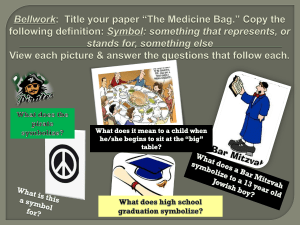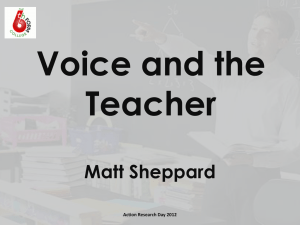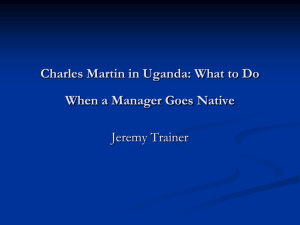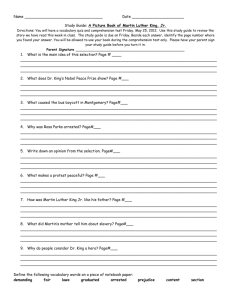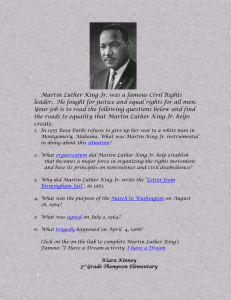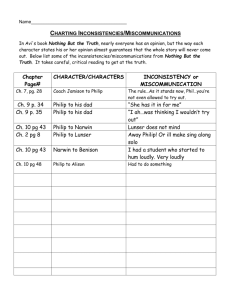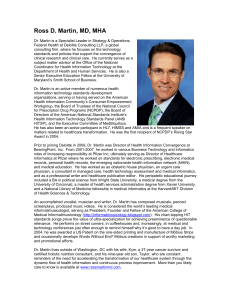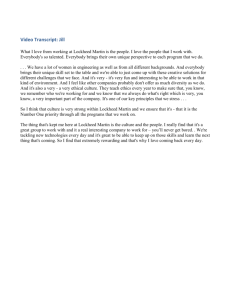© F A R Bennion - Francis Bennion
advertisement
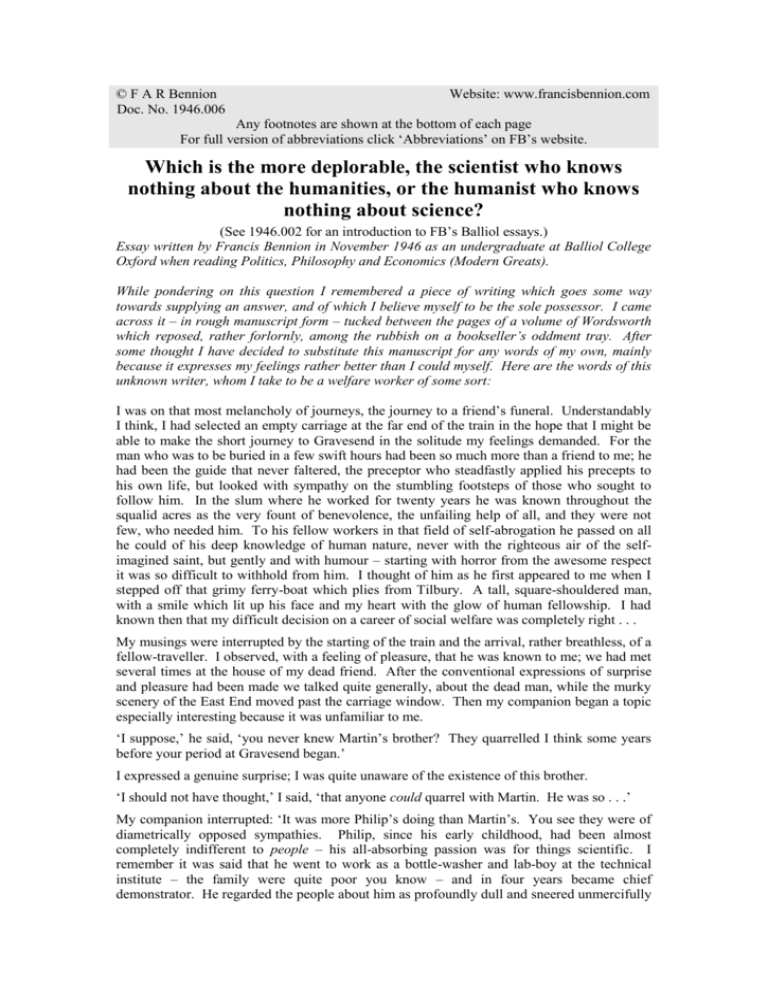
© F A R Bennion Doc. No. 1946.006 Website: www.francisbennion.com Any footnotes are shown at the bottom of each page For full version of abbreviations click ‘Abbreviations’ on FB’s website. Which is the more deplorable, the scientist who knows nothing about the humanities, or the humanist who knows nothing about science? (See 1946.002 for an introduction to FB’s Balliol essays.) Essay written by Francis Bennion in November 1946 as an undergraduate at Balliol College Oxford when reading Politics, Philosophy and Economics (Modern Greats). While pondering on this question I remembered a piece of writing which goes some way towards supplying an answer, and of which I believe myself to be the sole possessor. I came across it – in rough manuscript form – tucked between the pages of a volume of Wordsworth which reposed, rather forlornly, among the rubbish on a bookseller’s oddment tray. After some thought I have decided to substitute this manuscript for any words of my own, mainly because it expresses my feelings rather better than I could myself. Here are the words of this unknown writer, whom I take to be a welfare worker of some sort: I was on that most melancholy of journeys, the journey to a friend’s funeral. Understandably I think, I had selected an empty carriage at the far end of the train in the hope that I might be able to make the short journey to Gravesend in the solitude my feelings demanded. For the man who was to be buried in a few swift hours had been so much more than a friend to me; he had been the guide that never faltered, the preceptor who steadfastly applied his precepts to his own life, but looked with sympathy on the stumbling footsteps of those who sought to follow him. In the slum where he worked for twenty years he was known throughout the squalid acres as the very fount of benevolence, the unfailing help of all, and they were not few, who needed him. To his fellow workers in that field of self-abrogation he passed on all he could of his deep knowledge of human nature, never with the righteous air of the selfimagined saint, but gently and with humour – starting with horror from the awesome respect it was so difficult to withhold from him. I thought of him as he first appeared to me when I stepped off that grimy ferry-boat which plies from Tilbury. A tall, square-shouldered man, with a smile which lit up his face and my heart with the glow of human fellowship. I had known then that my difficult decision on a career of social welfare was completely right . . . My musings were interrupted by the starting of the train and the arrival, rather breathless, of a fellow-traveller. I observed, with a feeling of pleasure, that he was known to me; we had met several times at the house of my dead friend. After the conventional expressions of surprise and pleasure had been made we talked quite generally, about the dead man, while the murky scenery of the East End moved past the carriage window. Then my companion began a topic especially interesting because it was unfamiliar to me. ‘I suppose,’ he said, ‘you never knew Martin’s brother? They quarrelled I think some years before your period at Gravesend began.’ I expressed a genuine surprise; I was quite unaware of the existence of this brother. ‘I should not have thought,’ I said, ‘that anyone could quarrel with Martin. He was so . . .’ My companion interrupted: ‘It was more Philip’s doing than Martin’s. You see they were of diametrically opposed sympathies. Philip, since his early childhood, had been almost completely indifferent to people – his all-absorbing passion was for things scientific. I remember it was said that he went to work as a bottle-washer and lab-boy at the technical institute – the family were quite poor you know – and in four years became chief demonstrator. He regarded the people about him as profoundly dull and sneered unmercifully at poor Martin and his philosophical books. The only thing they had in common was a love of music.’ ‘What happened to him in the end?’ I asked. ‘I believe he got a good job researching over in the States. There was a story that he had died after taking part in some yellow-fever tests.’ We fell into silence – I musing at the odd chance that had made a brilliant scientist and a deeply-feeling humanitarian brothers in a poor, undistinguished family. We did not speak again until we had left the train and begun to breathe the dank, cold air of Tilbury. ‘Look,’ whispered my companion, as we hurried over the cobbles towards the ferry landingstage, ‘do you see that tall, thin gentleman just ahead of us?’ I nodded. ‘That is Ernest Oldley, the music critic. He and Martin were great friends. Good afternoon, Mr Oldley,’ as we overtook him. ‘Are you bound on the same melancholy errand as ourselves?’ ‘Yes,’ said Oldley, and added: ‘The world has lost a fine musician.’ Again I felt surprise; Martin I knew, had strummed a piano pleasantly enough – but, a fine musician! But Oldley was emphatic; Martin, it appeared, was not only a first-class pianist, but a composer of ability as well. ‘How easy it is,’ I reflected, ‘to think one knows a person. How incredibly difficult really to know him!’ I experienced no further surprises about Martin. The funeral passed off in that leaden way common to funerals and before many hours had passed I was back at home. That night I had a dream so vivid that, on waking, I rushed to my desk, and by the feeble light of an electric torch, wrote down the details in hurried shorthand whilst they were fresh in mind. Here is what I wrote: ‘I am moving at incredible speed over a great plain, borne on, it appears by a mighty wind which roars in my ears and mingles with the cries of other creatures similarly transported. Overhead is the red sullen face of a huge sun, whose light is nevertheless so feeble as only dimly to illuminate the enormous plateau. Suddenly a large figure comes into view, seated on an uprising rock. As we are swept along I see the features of Martin, and that wonderful smile shines out so brightly that the red sun becomes invisible and the twilight gives way to a golden luminosity. As we near the figure of Martin the wind dies away and we are left, breathless, gazing up adoringly. The entranced silence is suddenly broken, by a shout – repeated until our ears are dazed – Imposter! Imposter! Imposter! The golden glow, and with it the scene, fades with each repetition until there is complete darkness and complete silence. Then I become aware that I am in a room recognizable as Martin’s study. In the armchairs on either side of the fireplace, two figures are visible as silhouettes; behind them the firelight dances. The figure on the right speaks, and I recognize Martin’s voice. ‘Why do you call me an imposter Philip?’ ‘Because you nurse the sick, weak thing called Man, fostering it in its feebleness, encouraging it to defy what should be the inexorable Laws of Nature, feeding its vanity by ministration to its petty pains and pleasures, and at the same time encouraging your dupes to look upon you as the fount of truth and well of purity. Imposter! ‘You judge me too harshly Philip. I believe that the proper study of mankind is man, and that benevolence is the highest good it is possible for a human being to practice.’ ‘– and what of Truth? Does not the mastery of Nature’s secrets, the knowledge of worlds and eternities mean more to you than the puny activities of mere high-bred animals?’ ‘I have not neglected Truth Philip, but I have regarded the physical world as merely a stage set for the performance of the Human Drama, that Drama which moves from act to act, from scene to scene of human history, witnessing innumerable mutations, until the curtain shall fall on creatures as perfect as the limitations of their stage permit.’ ‘Now you are coming to science for a theory! That is just Evolution, masquerading in high-flown metaphor!’ ‘Your sneers are unworthy, Philip. The conception I have of the purpose behind the creation of Man has grown in my mind, the fruit of contemplation and experience. I conceive it to be fully possible for a man to live a useful, balanced life without any more knowledge of things scientific than he brings from his school-days. I have found the deepest satisfaction in the study of men’s thoughts and actions and in the promotion of their welfare. The sense of duty done, of conscience obeyed is an uplifting, allpervading joy. I have little to regret Philip.’ There is a pause before the silhouette on the left speaks again. ‘You have missed something which transcends all your dull joy in benevolence. You have missed the exhilaration of toiling after eternal truths, of breaking a morsel from the forbidden fruit and tasting it in the company of a lonely few. Above all, you have missed that sacrifice at the altar of Discovery and that knowledge that your body will form a step on the long stairway which reaches up into the vaults of Understanding.’ ‘And why did you make that sacrifice Philip? Why, if not for the aid of suffering men? Why else should you seek knowledge of yellow fever if not to find a means of fighting it? You must see that I am right Philip. The human being who divorces himself from humanity is an outcast. You could not remain an outcast, you had to die for the sake of men, fight the thought as you will. It is you who are the imposter – hiding your interest in humanity behind the cold mask of science, knowing that without that interest you would be a machine, a terrifying machine!’ The echo of Martin’s last word hangs in the air until drowned by swelling chords of music. I recognize by some remote perception a Bach duet. Before my eyes I see a keyboard with two pairs of hands forming the ever-moving patterns which make the music. Faster they move and faster. The music rises to crescendo. Suddenly, above the tumult, Martin’s voice rings out in triumph: ‘Man’s music, Philip, man’s music!’ * * * * * There the manuscript ends, but perhaps I should go on to quote part of the poem, which seems to have inspired its author, printed on one of the pages between which I found it. I suppose this because the lines are heavily underscored and occur on one of the pages between which the manuscript was inserted. I have learned To look on nature, not as in the hour Of thoughtless youth; but hearing oftentimes The still, sad music of humanity, Nor harsh nor grating, though of ample power To chasten and subdue. And I have felt A presence that disturbs me with the joy Of elevated thoughts; a sense sublime Of something far more deeply interfused, Whose dwelling is the light of setting suns, And the round ocean and the living air, And the blue sky, and in the mind of man.
